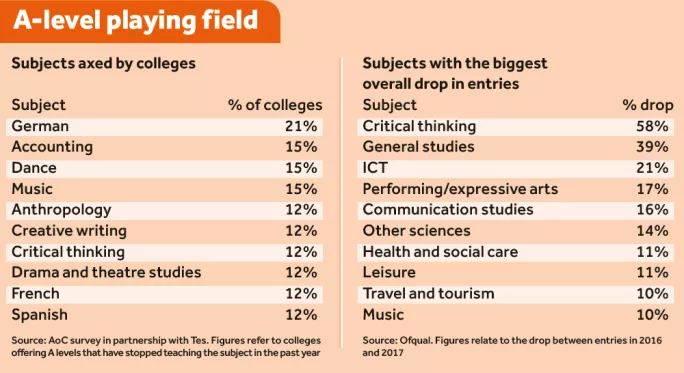Cash-strapped colleges forced to ditch A levels

The reformed A levels - taken for the first time this summer - were designed to be “more rigorous” than the legacy qualifications and “provide students with the skills and knowledge needed for progression to undergraduate study” .
But new research reveals that 60 per cent of colleges offering A levels have reduced the number of subjects available to students. A survey of college leaders, carried out by the Association of Colleges (AoC), in partnership with Tes, shows that a wide range of subjects is being axed.
One in five of the colleges surveyed had stopped teaching German over the past year, with multiple colleges also dropping accounting, dance and music (see box below).
Half of the colleges surveyed said that the main reason for cutting A-level options was a lack of demand from students, with 9 per cent blaming low funding and 6 per cent attributing it to staffing issues.
This year’s entry figures from Ofqual reveal that the biggest drops for this cohort were recorded in critical thinking and general studies (both discontinued by awarding bodies), followed by ICT, performing/ expressive arts and communication studies.
But it is the issue of funding, and the consequences for the breadth of education on offer, that poses the biggest concern for AoC chief executive David Hughes. “The most worrying impact is that on students,” he says. “Their range of opportunities to study and the number of hours of tuition, support and extracurricular activities they receive have diminished enormously.
“Our young people are in danger of getting short-changed compared with their counterparts in other countries and compared with previous generations. That cannot be right, which is why we have called on the government to increase the base rate for 16-19 funding to match that for 11- to 16-year-olds.”
Increased competition
According to the Sixth Form Colleges’ Association (SFCA), per-student funding for sixth formers is, on average, 21 per cent less than that for secondary students. Hughes adds that A-level reforms have also had an impact on recruitment, but it is too early to say exactly what effect this will have.
He also blames the increased competition from school sixth forms for a reduced curriculum in some areas, as institutions compete for students. Between 2010 and 2015, 169 new school sixth forms were opened. However, the number of students aged 16-18 declined during the same period.
Guidance published by the Department for Education in April 2016 stressed that schools should only be allowed to open a new sixth form if it would have 200 students and offer 15 different A levels.
“The government has agreed to the opening of too much new 16-19 provision, even in areas of good supply,” Hughes adds.

Last month, apprenticeships and skills minister Anne Milton revealed that there had been an underspend of more than £130 million in the 16-19 budget in each of the past two years, which she partly attributed to lower-than-expected student numbers.
Bill Watkin, chief executive of the SFCA, says financial pressures are the primary reason for A-level subjects being dropped.
“Sixth-form funding levels have now for some years been too low to be able to afford a full curriculum,” he says. “And lower funding levels mean a class size has to be bigger for it to be viable.”
The move to a linear, two-year A-level programme, following the decision to scrap AS levels, has also led to a reduced offer, he adds, with colleges increasingly allowing students to take just three subjects, rather than enrolling on four with a view to dropping one of them at the end Year 12.
Sir George Monoux College in East London has switched to offering three A-level subjects instead of four. This trend nationally will result in students facing a “reduced choice and a narrower education”, according to David Ball, vice-principal for corporate services. “We withdrew subjects for three main reasons,” he says. “Firstly, the difficulties of recruiting the specialist staff needed to teach them. Secondly, because the exam boards have not developed subjects for the new A-level system, such as communication and culture. Finally, subjects such as classical civilisation were withdrawn owing to the lack of student interest.”
Hereford Sixth Form College this year stopped offering music technology and applied science because of low student demand, says principal Jonathan Godfrey. It has also been forced to cancel archaeology, critical thinking and general studies due to their discontinuation by awarding bodies. “I can understand why a large number of colleges have cut subjects for financial reasons,” he adds. “On the whole, we have been able to make efficiencies elsewhere.”
Earlier this year, an SFCA survey showed that some 61 per cent of sixth-form colleges were planning to offer three subjects as standard for 2017-18, with only the most academically able students having the option of starting four subjects.
But Watkin insists that some subjects such as music and drama could be worth persisting with: “The danger in the system is that we become exam factories and we put all the resources into examined qualifications and risk losing some of the enrichment around that, such as pastoral support, Ucas guidance and careers advice.”
A Department for Education spokesperson says: “We’re protecting the base rate of funding for 16- and 17-year-olds in full-time education at £4,000 until 2020. Schools and colleges also receive additional funding to reflect increased costs, including for disadvantaged students, higher cost technical courses, and large academic programmes.”
You need a Tes subscription to read this article
Subscribe now to read this article and get other subscriber-only content:
- Unlimited access to all Tes magazine content
- Exclusive subscriber-only stories
- Award-winning email newsletters
Already a subscriber? Log in
You need a subscription to read this article
Subscribe now to read this article and get other subscriber-only content, including:
- Unlimited access to all Tes magazine content
- Exclusive subscriber-only stories
- Award-winning email newsletters